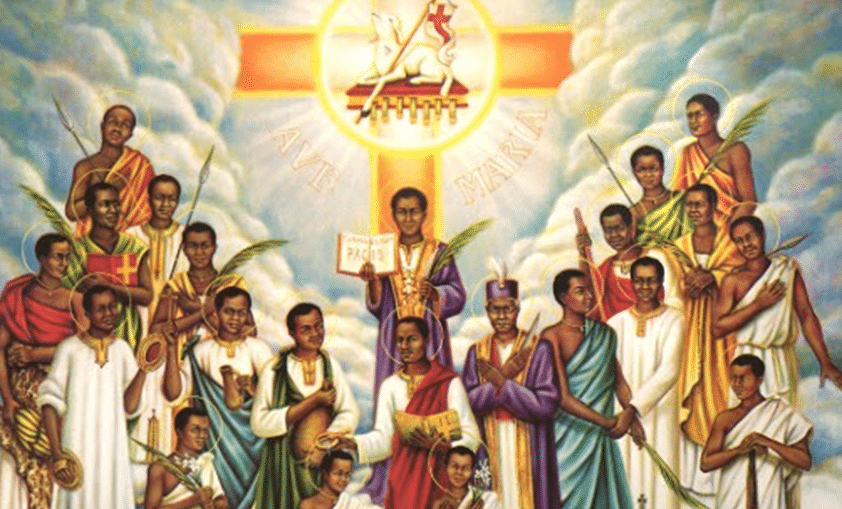Looking at today’s society, it’s not hard to see that the virtue of chastity is under great assault in our world today.
Even for those of us who have the best intentions to remain pure, staying the course can prove to be very difficult in the midst of the many temptations and pressures to give in to impurity.
For any of us who have ever lamented how difficult a task it is to remain chaste, Saint Charles Lwanga and Companions can be great examples and intercessors for us.
They were martyred by a king who was hostile to Christianity. But the reason he had them killed ultimately began with their refusal to give in to his impurity.
As we celebrate the feast day of St. Charles Lwanga and Companions today on June 3, we can look to the heroic example they gave when they refused to compromise on the demands of Christian chastity.
St. Charles’ Lwanga’s early life and conversion

St. Charles Lwanga was born in the kingdom of Buganda (the central and southern area of modern-day Uganda) in 1806. He was born into the Baganda tribe. He was not a Christian, but as a young man he encountered Christianity and longed to convert.
Charles was a servant in the court of King Mwanga II of Buganda. Many of the other servants in the court were Christians who had been converted to the Faith by the efforts of missionary priests.
During the time that he served at court with these Christians, Charles himself became a Christian. He was twenty-five years old when he was baptized.
Servants to a violent king

King Mwanga was a harsh and evil ruler. He had tendencies toward homosexual sins, and he frequently forced himself upon the men and boys who served him.
A man named Joseph Mukasa Balikuddembe was the king’s majordomo. Joseph was a holy Christian man.
When King Mwanga had a Protestant missionary and the missionary’s companions killed, Joseph courageously confronted the king over both this violence and his sexually immoral behavior.
Though King Mwanga had always been somewhat fond of Joseph, the king was very angry at Joseph’s reproaches. He ordered Joseph to be killed.
Joseph did not resist but instead said he was not afraid to die for God. Before being beheaded and burned, Joseph pleaded for the king to repent.
Though the king did not repent, Joseph’s plea may have had some effect on him because the king’s persecution of Christians greatly decreased for six months after Joseph’s death.
The king ordered Charles Lwanga to take over Joseph’s duties as majordomo. Charles also voluntarily took over Joseph’s Christian leadership duties, instructing others in the Faith and protecting the young boys from the king’s immoral advances.
The king condemns the Christians

It wasn’t long before King Mwanga realized that many of his servants were being instructed in Christianity.
Suspicious that the number of Christians was growing, he called one of his pages and asked him why the king had seen so little of him lately. The page replied that he had been busy receiving instruction in the Christian Faith from a man named Denis Sebuggwawo.
King Mwanga was very angry to learn this. He had Denis Sebuggwawo summoned. Then, he killed Denis by thrusting a sword into Denis’ throat.
The king knew that the Christian religion prohibited his servants from participating in sexual sins with him, so he was very angry to learn that the number of Christians was actively increasing.
So King Mwanga called an assembly. He commanded the Christian members of his court to separate themselves from the rest. Then, he told them to renounce their Christian Faith.
Charles Lwanga led the Christians of the court in refusing to renounce the Christian faith. This refusal angered King Mwanga further, and he demanded that all the Christians in his court be killed.
Preparing for a holy death

Some of the boys and men who had been condemned to death for their Christian faith were not yet baptized. So Charles baptized them quickly.
The king commanded that those who refused to renounce their faith be sent on a thirty-seven-mile hike to the place where they were to be killed.
This journey was harrowing, and three of the Christian were killed on the way. Despite the sufferings, the Christians remained courageous and joyful as they approached their deaths.
They hiked past the home of the missionary priests who had been responsible for planting the seeds of Christianity. These priests were amazed to see that the condemned Christians, even a thirteen-year-old boy, were laughing and talking.
When the group of Christians finally reached the place where they were to be executed, their captors imprisoned them for seven days. Despite this suffering, they still refused to renounce their faith.
One of younger Christians, a boy named Mbaga, was the son of the chief executioner. This executioner begged Mbaga to renounce his faith and save himself, but Mbaga courageously held fast.
The executioner then ordered that Mbaga be executed before the others. After Mgaga was killed, the other prisoners were put onto a pyre.
While they burned to death, the Christians’ last words were the name of Jesus.
St. Charles Lwanga and Companions are the patron saints of converts and of torture victims, but they can also be great patron saints for anyone who struggles to remain chaste amidst great difficulty.
As we continue our own journeys against the impurity and unchastity we often see in the world around us today, let us turn to St. Charles Lwanga and his holy Companions for inspiration and intercession.
St. Charles Lwanga and Companions, pray for us!



